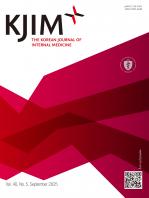|
Cardiology / Original Article
The current status and outcomes of in-hospital P2Y12 receptor inhibitor switching in Korean patients with acute myocardial infarction
Keun-Ho Park, Myung Ho Jeong, Hyun Kuk Kim, Young-Jae Ki, Sung Soo Kim, Youngkeun Ahn, Hyun Yi Kook, Hyo-Soo Kim, Hyeon Cheol Gwon, Ki Bae Seung, Seung Woon Rha, Shung Chull Chae, Chong Jin Kim, Kwang Soo Cha, Jong Seon Park, Jung Han Yoon, Jei Keon Chae, Seung Jae Joo, Dong-Joo Choi, Seung Ho Hur, In Whan Seong, Myeong Chan Cho, Doo Il Kim, Seok Kyu Oh, Tae Hoon Ahn, Jin Yong Hwang; on behalf of the KAMIR-NIH registry investigators
Korean J Intern Med. 2022;37(2):350-365. Published online January 12, 2022
Background/Aims: While switching strategies of P2Y12 receptor inhibitors (RIs) have sometimes been used in acute myocardial infarction (AMI) patients, the current status of in-hospital P2Y12RI switching remains unknown.
Methods: Overall, 8,476 AMI patients who underwent successful revascularization..
|
|
|
Cardiology / Original Article
Clinical characteristics and outcomes in acute myocardial infarction patients with versus without any cardiovascular risk factors
Ah-Ra Choi, Myung Ho Jeong, Young Joon Hong, Seok-Joon Sohn, Hyun Yi Kook, Doo Sun Sim, Young Keun Ahn, Ki Hong Lee, Jae Yeong Cho, Young Jo Kim, Myeong Chan Cho, Chong Jin Kim; other Korea Acute Myocardial Infarction Registry Investigators
Korean J Intern Med. 2019;34(5):1040-1049. Published online September 1, 2018
Background/Aims: Although cardiovascular (CV) risk factors are well established, some patients experience acute myocardial infarction (AMI) even without any risk factors.
Methods: We analyzed total 11,390 patients (63.6 ± 12.6 years old, 8,401 males) with AMI enrolled in Korea Acute Myocardial In..
|
|
|
Cardiology / Review
Current status of acute myocardial infarction in Korea
Yongcheol Kim, Youngkeun Ahn, Myeong Chan Cho, Chong Jin Kim, Young Jo Kim, Myung Ho Jeong
Korean J Intern Med. 2019;34(1):1-10. Published online December 28, 2018
Coronary artery disease, especially acute myocardial infarction (AMI), is a leading cause of death in the Asia-Pacific region. The Korea Acute Myocardial Infarction Registry (KAMIR) is the first nationwide, prospective, multicenter registry of Korean patients with AMI. Since the KAMIR first began in..
|
|
|
Cardiology / Original Article
Angiotensin II type 1 receptor blockers as a first choice in patients with acute myocardial infarction
Jang Hoon Lee, Myung Hwan Bae, Dong Heon Yang, Hun Sik Park, Yongkeun Cho, Won Kee Lee, Myung Ho Jeong, Young Jo Kim, Myeong Chan Cho, Chong Jin Kim, Shung Chull Chae, Korea Acute Myocardial Infarction Registry Investigators
Korean J Intern Med. 2016;31(2):267-276. Published online December 23, 2015
Background/Aims: Angiotensin II type 1 receptor blockers (ARBs) have not been adequately evaluated in patients without left ventricular (LV) dysfunction or heart failure after acute myocardial infarction (AMI).
Methods: Between November 2005 and January 2008, 6,781 patients who were not receiving a..
|
|
|
Cardiology / Review
The scientific achievements of the decades in Korean Acute Myocardial Infarction Registry
Hyun Kuk Kim, Myung Ho Jeong, Seung Hun Lee, Doo Sun Sim, Young Joon Hong, Youngkeun Ahn, Chong Jin Kim, Myeong Chan Cho, Young Jo Kim
Korean J Intern Med. 2014;29(6):703-712. Published online October 31, 2014
The Korea Acute Myocardial Infarction Registry (KAMIR) was the first nationwide registry data collection designed to track outcomes of patients with acute myocardial infarction (AMI). These studies ref lect the current therapeutic approaches and management for AMI in Korea. The results of KAMIR coul..
|
|
|
Original Article
Comparison of Drug-Eluting Stents in Acute Myocardial Infarction Patients with Chronic Kidney Disease
Daisuke Hachinohe, Myung Ho Jeong, Shigeru Saito, Min Chol Kim, Kyung Hoon Cho, Khurshid Ahmed, Seung Hwan Hwang, Min Goo Lee, Doo Sun Sim, Keun-Ho Park, Ju Han Kim, Young Joon Hong, Youngkeun Ahn, Jung Chaee Kang, Jong Hyun Kim, Shung Chull Chae, Young Jo Kim, Seung Ho Hur, In Whan Seong, Taek Jong Hong, Donghoon Choi, Myeong Chan Cho, Chong Jin Kim, Ki Bae Seung, Wook Sung Chung, Yang Soo Jang, Seung Woon Rha, Jang Ho Bae, Seung Jung Park,
Korean J Intern Med. 2012;27(4):397-406. Published online November 27, 2012
Background/AimsTo determine which drug-eluting stents are more effective in acute myocardial infarction (MI) patients with chronic kidney disease (CKD). MethodsThis study included a total of 3,566 acute MI survivors with CKD from the Korea Acute..
|
|
|
Original Article
The Epidemiological and Clinical Characteristics of Patients Admitted for Coronary Angiography to Evaluate Ischemic Heart Disease
Jong Seon Park, Hyun Ju Lee, Young Jo Kim, In Whan Seong, Jae Hwan Lee, Chong Jin Kim, Jin Man Cho, Myeong Chan Cho, Jang Whan Bae, Myung Ho Jeong, Young Keun Ahn, Kyoo Rok Han, Jun Hee Lee, Moo Hyun Kim
Korean J Intern Med. 2007;22(2):87-92. Published online June 30, 2007
BackgroundMost of the known risk factors associated with ischemic heart disease are based on studies from Western countries; there is only limited information on Korean populations. This study was designed to analyze age related differences in epidemiologic and clinical charac..
|
|
|
Case Report
Recurrent Asystoles Associated with Vasovagal Reaction during Venipuncture
Eun Ju Cho, Tai Ho Rho, Hee Yeol Kim, Chong Jin Kim, Man Young Lee, Seung Won Jin, Joon Cheol Park, Jae Hyung Kim, Soon Jo Hong, Kyu Bo Choi
Korean J Intern Med. 2000;15(3):232-235. Published online December 1, 2000
|
|
|
Original Article
Transesophageal Echocardiographic Detection of Thoracic Aortic Plaque Could Noninvasively Predict Significant Obstructive Coronary Artery Disease
Hee Yeol Kim, Chong Jin Kim, Tai Ho Rho, Ho Jung Youn, Seong Won Jin, Hyou Young Rhim, Ji Won Park, Heu Kyung Jeon, Jang Seong Chae, Jae Hyung Kim, Soon Jo Hong, Kyu Bo Choi
Korean J Intern Med. 1999;14(2):20-26. Published online July 1, 1999
|
|
|
















